六年级一般过去时讲解与练习
一般过去时(讲义)-人教PEP版英语六年级下册
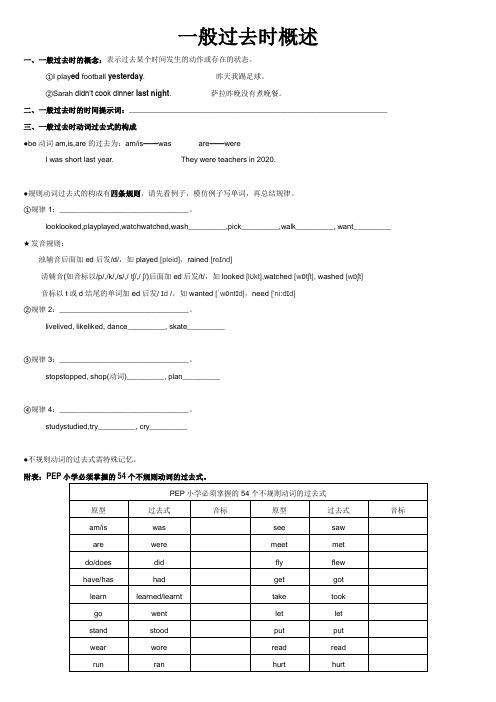
一般过去时概述一、一般过去时的概念:表示过去某个时间发生的动作或存在的状态。
①I play ed football yesterday. 昨天我踢足球。
②Sarah didn’t cook dinner last night. 萨拉昨晚没有煮晚餐。
二、一般过去时的时间提示词:______________________________________________________________三、一般过去时动词过去式的构成●be动词am,is,are的过去为:am/is——was are——wereI was short last year. They were teachers in 2020.●规则动词过去式的构成有四条规则,请先看例子,模仿例子写单词,再总结规律。
①规律1:_______________________________。
looklooked,playplayed,watchwatched,wash_________,pick_________,walk_________, want_________ ★发音规则:浊辅音后面加ed后发/d/,如played [pleid],rained [reɪnd]清辅音(如音标以/p/,/k/,/s/,/ tʃ/,/ʃ/)后面加ed后发/t/,如looked [lʊkt],watched [wɒtʃt], washed [wɒʃt]音标以t或d结尾的单词加ed后发/ɪd /,如wanted [ˈwɒntɪd],need ['ni:dɪd]②规律2:_______________________________。
livelived, likeliked, dance_________, skate_________③规律3:_______________________________。
stopstopped, shop(动词)_________, plan_________④规律4:_______________________________。
新标准英语六年级下册一般过去时语法复习与练习
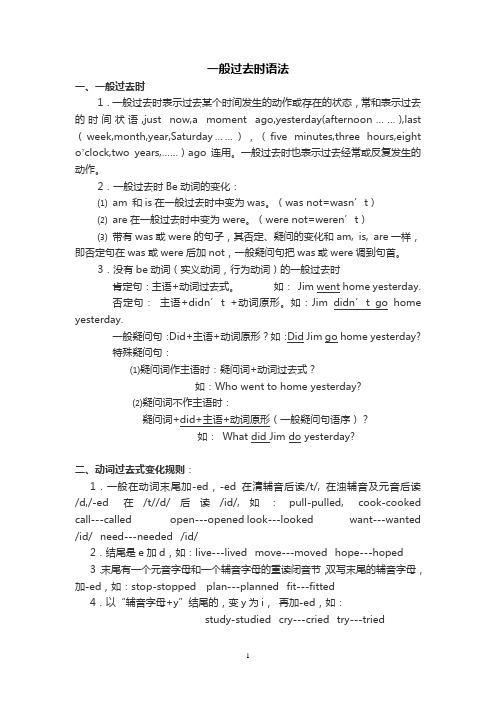
一般过去时语法一、一般过去时1.一般过去时表示过去某个时间发生的动作或存在的状态,常和表示过去的时间状语,just now,a moment ago,yesterday(afternoon……),last (week,month,year,Saturday……),(five minutes,three hours,eight o’clock,two years,……)ago连用。
一般过去时也表示过去经常或反复发生的动作。
2.一般过去时Be动词的变化:⑴ am 和is在一般过去时中变为was。
(was not=wasn’t)⑵ are在一般过去时中变为were。
(were not=weren’t)⑶带有was或were的句子,其否定、疑问的变化和am, is, are一样,即否定句在was或were后加not,一般疑问句把was或were调到句首。
3.没有be动词(实义动词,行为动词)的一般过去时肯定句:主语+动词过去式。
如: Jim went home yesterday.否定句:主语+didn’t +动词原形。
如:Jim didn’t go home yesterday.一般疑问句:Did+主语+动词原形?如:Did Jim go home yesterday?特殊疑问句:⑴疑问词作主语时:疑问词+动词过去式?如:Who went to home yesterday?⑵疑问词不作主语时:疑问词+did+主语+动词原形(一般疑问句语序)?如:What did Jim do yesterday?二、动词过去式变化规则:1.一般在动词末尾加-ed,-ed在清辅音后读/t/, 在浊辅音及元音后读/d,/-ed在/t//d/后读/id/,如:pull-pulled, cook-cooked call---called open---opened look---looked want---wanted /id/ need---needed /id/2.结尾是e加d,如:live---lived move---moved hope---hoped3.末尾有一个元音字母和一个辅音字母的重读闭音节,双写末尾的辅音字母,加-ed,如:stop-stopped plan---planned fit---fitted 4.以“辅音字母+y”结尾的,变y为i,再加-ed,如:study-studied cry---cried try---tried 以“元音字母+y”结尾的,直接加-ed,如:play-played enjoy---enjoyed5.不规则动词过去式:如am, is-was, are-were, do-did,has,have-had see-saw, say-said……等不规则动词的过去式的构成:1.把动词原形中的i改为a,变成过去式。
(完整版)小学六年级英语一般过去时

第十七讲一般过去时一. 概念一般过去时表示过去某个时间发生的动作或存在的状态,常和表示过去的时间状语连用。
一般过去时也表示过去经常或反复发生的动作。
例句:1.I watched TV last night.我昨天晚上看电视。
2.What did you do yesterday?你昨天做了什么?3.They went to Beijing last year.他们去年去了北京。
二.用法1.表示过去发生的动作或状态,通常会有明确的表示过去的时间状语。
I went to the zoo yesterday.I stayed up last night.2.叙述过去连续发生的动作或状态。
This morning , I got up early , went out for a walk , then came back and cooked for my family .3.表示过去某一段不确定的时间内发生的动作或状态。
He worked in the store for 5 years.三.Be动词在一般过去时中的变化1. am 和is在一般过去时中变为was。
(was not=wasn't)2. are在一般过去时中变为were。
(were not=weren't)3. 带有was或were的句子,其否定、疑问的变化和is, am, are一样,即否定句在was或were后加not,一般疑问句把was或were调到句首。
四.句中没有be动词的一般过去时的句子1.否定句:didn't +动词原形,如:Jim didn't go home yesterday.2.一般疑问句:在句首加did,句子中的动词过去式变回原形。
如:Did Jim go home yesterday?3.特殊疑问句:疑问词+一般疑问句?如:What did Jim do yesterday?五.动词过去式变化规则1.一般在动词末尾加-ed,如:pull-pulled, cook-cooked2.结尾是e加d,如:taste-tasted3.末尾是辅音字母加一个元音字母和一个辅音字母的重读闭音节,应双写末尾的辅音字母,再加-ed,如:stop-stopped4.以“辅音字母+y”结尾的,变y为i,再加-ed,如:study-studied六.真题再现( ) 1. The boy the tree last week.A. is wateringB. watersC. watered2. I _____(see) his name in the newspaper yesterday.因为句中出现了表示过去的时间状语last week和yesterday,所以正确答案分别为:1. C2.saw精点精练一、用动词的适当形式填空。
六年级英语一般过去时讲解与练习

六年级(Ji)英语一般过去时讲解与练习1.一般过去时表示过去某个时间发生的动作或存在的状态,常和表示过去的时间状语连用。
一般过去时也表示过去经常或反(Fan)复发生的动作。
2.Be动词在一般过去时(Shi)中的变化:⑴am 和is在一般(Ban)过去时中变为was。
(was not=wasn’t)⑵are在一般过(Guo)去时中变为were。
(were not=weren’t)⑶带有was或were的句(Ju)子,其否定、疑问的变化和is, am, are一样(Yang),即否定句在was或were后加not,一般疑问句把was或were调到句首。
3.句中没(Mei)有be动词的一般过去时的句子否定句:didn’t +动词原形,如:Jim didn’t go home yesterday. 一般疑问句:在句首加did,句子中的动词过去式变回原形。
如:Did Jim go home yesterday?特殊疑问句:⑴疑问词+did+主语+动词原形?如:What did Jim do yesterday? ⑵疑问词当主语时:疑问词+动词过去式?如:Who went to home yesterday? 动词过去式变化规则:1.一般在动词末尾加-ed,如:play-played, cook-cooked2.结尾是e加d,如:taste-tasted3.末尾只有一个元音字母和一个辅音字母的重读闭音节,应双写末尾的辅音字母,再加-ed,如:stop-stopped4.以“辅音字母+y”结尾的,变y为i,再加-ed,如:study-studied 5.小学常用不规则动词过去式:am,is-was, are-were, do-did, see-saw, say-said, give-gave, get-got, go-went, have-had, eat-ate, take-took, run-ran, sing-sang, put-put, make-made, read-read, write-wrote, draw-drew, drink-drank, fly-flew, ride-rode, speak-spoke, sweep-swept, swim-swam, sit-sat一.用be动词的适当形式填空1. We __________ students five years ago.2. Patti and I __________ good friends.3. Today __________ Tuesday, Yesterday __________ Monday.4. Sue __________ on the slide a moment ago.5. Where is my hat? It _______ on the desk just now.二.单项选择:从下列各题后所给的四个选项中选择最佳答案填空。
六年级上册英语-一般过去时讲义知识点 练习 沪教牛津版

一般过去时概念:一般过去时表示过去某个时间发生的动作或存在的状态,常和表示过去的时间状语连用。
一般过去时也表示过去经常或反复发生的动作。
重点:一般过去时态概念、用法及动词过去式变化规则难点:一般过去时的句子如何变为一般疑问句和特殊疑问句Be动词的一般过去时态变化⑴am 和is在一般过去时中变为was。
(was not=wasn’t)⑵are在一般过去时中变为were。
(were not=weren’t)⑶带有was或were的句子,其否定、疑问的变化和is, am, are一样,即否定句在was或were 后加not,一般疑问句把was或were调到句首。
句中没有be动词的一般过去时的句子肯定句:动词用一般过去时态,如:Jim went home yesterday.否定句:didn’t +动词原形,如:Jim didn’t go home yesterday.一般疑问句:在句首加did,句子中的动词过去式变回原形。
如:Did Jim go home yesterday?特殊疑问句:(1)疑问词+did+主语+动词原形?如:What did Jim do yesterday?Where did Jim go yesterday?⑵疑问词当主语时:疑问词+动词过去式?如:Who went home yesterday?动词过去式变化规则1.一般在动词末尾加-ed,如:pull-pulled, cook-cooked2.以e结尾的动词,直接加-d,如:taste-tasted3.以重读闭音节(即:辅音+元音+辅音)结尾且末尾只有一个元音字母和一个辅音字母的动词,双写末尾的辅音字母,再加-ed,如:stop-stopped4.以“辅音字母+y”结尾的,变y为i,再加-ed,如:study-studied5.不规则动词过去式:am,is-was,are-were, do-did, see-saw, say-said, give-gave,get-got, go-went, come-came, have-had, eat-ate,take-took, run-ran, sing-sang, put-put, make-made,read-read, write-wrote, draw-drew, drink-drank, fly-flew, ride-rode, speak-spoke, sweep-swept, swim-swam, sit-sat一.过去时练习。
(完整版)六年级英语一般过去时练习题及答案讲解
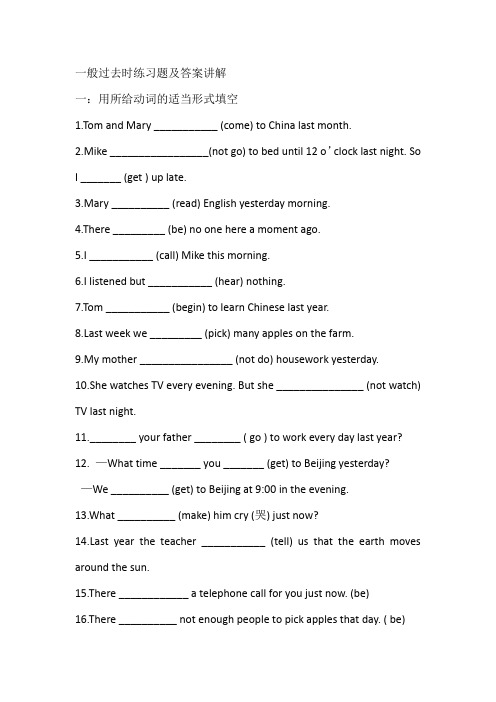
一般过去时练习题及答案讲解一:用所给动词的适当形式填空1.Tom and Mary ___________ (come) to China last month.2.Mike _________________(not go) to bed until 12 o’clock last night. SoI _______ (get ) up late.3.Mary __________ (read) English yesterday morning.4.There _________ (be) no one here a moment ago.5.I ___________ (call) Mike this morning.6.I listened but ___________ (hear) nothing.7.Tom ___________ (begin) to learn Chinese last year.st week we _________ (pick) many apples on the farm.9.My mother ________________ (not do) housework yesterday.10.She watches TV every evening. But she _______________ (not watch) TV last night.11.________ your father ________ ( go ) to work every day last year?12. —What time _______ you _______ (get) to Beijing yesterday?—We __________ (get) to Beijing at 9:00 in the evening.13.What __________ (make) him cry (哭) just now?st year the teacher ___________ (tell) us that the earth moves around the sun.15.There ____________ a telephone call for you just now. (be)16.There __________ not enough people to pick apples that day. ( be)17.There _____________ any hospitals (医院) in my hometown (家乡) in 1940. ( be not)18.There ____________ enough milk at home last week, wasn’t there?19.Eli ____________ to Japan last week. ( move)20. –When _______ you _________ (come) to China? - Last year.21.Did she ________ (have) supper at home?22.Jack ____________ (not clean) the room just now.23._________ (be) it cold in your city yesterday?24.How many people ________ (be) there in your class last term?25.It ________ (be) hot yesterday and most children _______ (be) outside.26. There ________ (be) a football match on TV yesterday evening, but I _________ (have) no time to watch it.27. He ate some bread and _________ (drink) some milk.28. ________ he __________ (finish) his homework last night?29. I__________(be) tired yesterday.30. I ___________(gain ) Arts degree last year.31. What _________ you ___________ (do) last night?32. My grandfather _________ (leave) Hong Kong for New York in 1998.33. What _______ he ________ (do) yesterday?34. Last week I _______ (buy) a new bike.35. He ________ (be) here just now.36. He __________ (not find ) his key last night.37. My father __________ (drink) a lot of wine yesterday.38. ________ you ________ (finish) your homework yesterday?39. I ________ (eat) some eggs and bread this morning.40. Her mother __________ (not give) the girl any present.二、改错题1.How is Jane yesterday? _____________________2.He go to school by bus last week. ____________________________ 3.He often goes home at 6:00 last month. ____________________________4.I can fly kites seven years ago. ______________________________ 5.Did you saw him just now. ____________________________________6.Tom wasn’t watch TV last night. ____________________________________7.I didn’t my homework yesterday. ____________________________________8.He wait for you three hours ago. ____________________________________9.Who find it just now ? ________________________________________三、按要求变换句型。
牛津译林版英语六年级下册期末知识点复习(一般过去时和一般将来时)附练习含答案
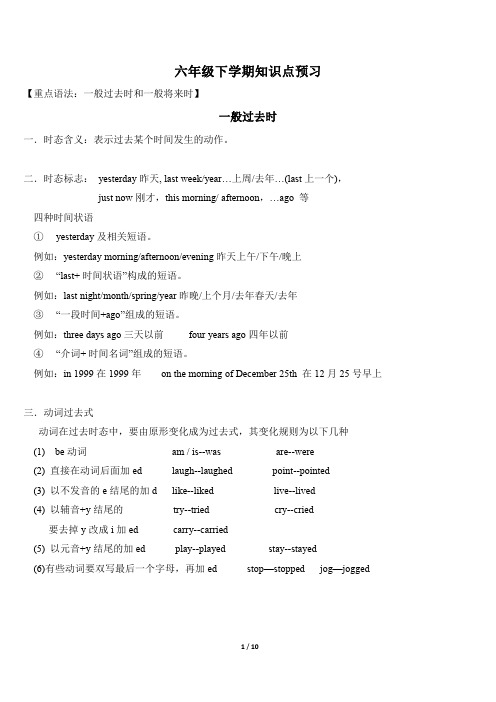
六年级下学期知识点预习【重点语法:一般过去时和一般将来时】一般过去时一.时态含义:表示过去某个时间发生的动作。
二.时态标志:yesterday昨天,last week/year…上周/去年…(last上一个),just now刚才,this morning/afternoon,…ago等四种时间状语①yesterday及相关短语。
例如:yesterday morning/afternoon/evening昨天上午/下午/晚上②“last+时间状语”构成的短语。
例如:last night/month/spring/year昨晚/上个月/去年春天/去年③“一段时间+ago”组成的短语。
例如:three days ago三天以前four years ago四年以前④“介词+时间名词”组成的短语。
例如:in1999在1999年on the morning of December25th在12月25号早上三.动词过去式动词在过去时态中,要由原形变化成为过去式,其变化规则为以下几种(1)be动词am/is--was are--were(2)直接在动词后面加ed laugh--laughed point--pointed(3)以不发音的e结尾的加d like--liked live--lived(4)以辅音+y结尾的try--tried cry--cried要去掉y改成i加ed carry--carried(5)以元音+y结尾的加ed play--played stay--stayed(6)有些动词要双写最后一个字母,再加ed stop—stopped jog—jogged(7)不规则变化(为过去时态中变化的难点,也是考试的重点)原形过去式原形过去式原形过去式do did go went say saidtell told can could get got have had give gave see saw become became fly flew bring brought eat ate take took find found lose lost stop stopped sing sang make made run ran swim swam hold held come came catch caught wear wore read read draw drew write wrote buy bought mean meant drink drank smell smelt keep kept put put throw threw slip slipped feel felt cut cut drive drove四.结构1.肯定句:主语+动词过去式2.一般疑问句:(1)句中含有be动词,将be动词提到句首,Was/Were+主语+……?Yes,…was/were./No,…wasn’t/weren’t.(2)句中无be动词,在句首加Did,动词变原形,Did+主语+动词原形……?Yes,…did./No,…didn’t.3.否定句的修改方法(1)句中含有be动词,直接在be动词后面加not,主语+wasn’t/weren’t…(2)句中无be动词,在动词前加didn’t,动词变原形,主语+didn’t+动词原形4.特殊疑问句:What did+主语+do?一般过去时练习一、请用正确动词形式填空。
牛津沪教版六年级上Unit5基础语法讲解与练习
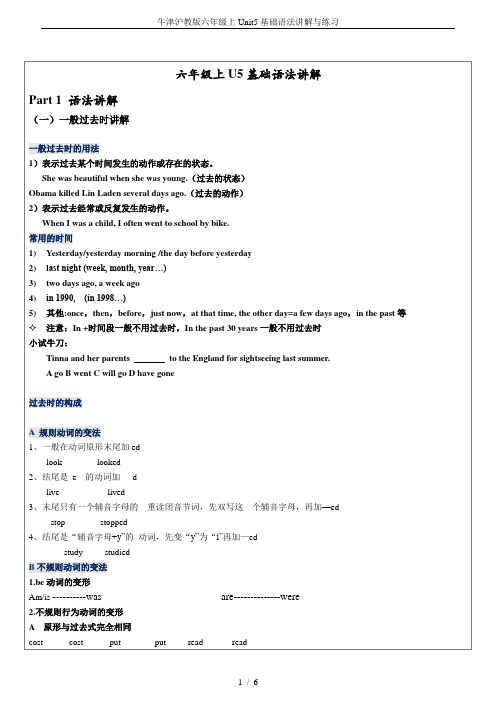
六年级上U5基础语法讲解Part 1 语法讲解(一)一般过去时讲解一般过去时的用法1)表示过去某个时间发生的动作或存在的状态。
She was beautiful when she was young.(过去的状态)Obama killed Lin Laden several days ago.(过去的动作)2)表示过去经常或反复发生的动作。
When I was a child, I often went to school by bike.常用的时间1)Yesterday/yesterday morning /the day before yesterday2)l ast night (week, month, year…)3)two days ago, a week ago4)in 1990, (in 1998…)5)其他:once,then,before,just now,at that time, the other day=a few days ago,in the past等 注意:In +时间段一般不用过去时,In the past 30 years一般不用过去时小试牛刀:Tinna and her parents to the England for sightseeing last summer.A goB wentC will goD have gone过去时的构成A 规则动词的变法1、一般在动词原形末尾加edlook looked2、结尾是e 的动词加-- dlive lived3、末尾只有一个辅音字母的重读闭音节词,先双写这个辅音字母,再加—edstop stopped4、结尾是“辅音字母+y”的动词,先变“y”为“i”再加—edstudy studiedB不规则动词的变法1.be动词的变形Am/is ----------was are--------------were2.不规则行为动词的变形A 原形与过去式完全相同cost---------cost put -----------put read----------readLet ---------let set------------set hit -----------hitB动词原形中的e变为oSell----------sold tell-------------told get------------gotC动词原形中的d变为tSpend----------spent lend---------lent send-------sentD动词原形中的ee去掉e,词尾加tFeel---------felt keep ----------kept sleep------slept这些规律没写全,希望学生课后找出其他规律注意特殊动词的变形说谎lie, lied躺lie, lay,下蛋,放置lay, laidE.g. A hen an egg; a boypicked it up , and it in the bag. Then he to his mother. There was no egg.一般过去时的基本句型1.系动词be的过去时.am(is) →was are →were陈述句:He was at home yesterday.否定句:He wasn’t at home yesterday.疑问句:Was he at home yesterday?Yes ,he was./No ,he wasn’t.2行为动词的一般过去时:陈述句主语+v-ed+其他I ate 100 eggs.否定句主语+did not /didn’t+v+其他I did not/didn’t eat 100 eggs.一般疑问句Did +主语+v+其他Did you eat 100 eggs?Yes, I did. /No,I didn’t.特殊疑问句疑问疑问词+did +主语+其他What did you eat?I ate 100 eggs练习1 写出所给词的过去式go _______ enjoy _______ buy _______ sit _______get _______ walk _______ take _______ dance ______write _______ run ______ swim _______ find _______begin _______ eat _______ play _______ study _______do _________ drink ____ sing ________ sleep_______2. 所给动词适当形式填空1. Tom and Mary ___________ (come) to China last month.2. Mike _________________(not go) to bed until 12 o'clock last night. So he ______ (get) up late.3. Mary __________ (read) English yesterday morning.(二)一般将来时讲解回顾定义:表示将来某一个时间将要发生的动作或存在的状态,也表示将来经常或重复发生的动作.一般将来时的标志:tomorrow(明天),the day after tomorrow(后天)next year(明年)next month(下一个月)next week(下一个星期)一般将来时的构成:1.主语+be(am,is,are) going to+V原形+......2.主语+will+V原形+.....3.一般疑问句:(1)be动词+主语+going to+动词原形+....(2).Will/+主语+动词原形+...4.特殊疑问句:(1).What(Where,How...)+be(am,is,are)+主语+going to+V原形+...?(2). What(When,Where,How...)+will+主语+V原形+...?注意:有些词如:go(去),come(来),leave(离开),start(开始)用现在进行时表示将来时.eg: (1)She is coming here tomorrow.(2) I am leaving this Friday.注意:"Be going to+动词原形+..." 表示一个事先考虑好的意图,,相当于文中的"打算,计划,准备"练习用动词的正确形式填空,每空一词。
- 1、下载文档前请自行甄别文档内容的完整性,平台不提供额外的编辑、内容补充、找答案等附加服务。
- 2、"仅部分预览"的文档,不可在线预览部分如存在完整性等问题,可反馈申请退款(可完整预览的文档不适用该条件!)。
- 3、如文档侵犯您的权益,请联系客服反馈,我们会尽快为您处理(人工客服工作时间:9:00-18:30)。
六年级一般过去时讲解与练习
1.一般过去时表示过去某个时间发生的动作或存在的状态,常和表示过去的时间状语连用。
一般过去时也表示过去经常或反复发生的动作感谢。
2.Be动词在一般过去时中的变化:
⑴am 和is在一般过去时中变为was。
(was not=wasn’t)
⑵are在一般过去时中变为were。
(were not=weren’t)
⑶带有was或were的句子,其否定、疑问的变化和is, am, are一样,即否定句在was或were后加not,一般疑问句把was或were调到句首。
3.句中没有be动词的一般过去时的句子
否定句:didn’t +动词原形,如:Jim didn’t go home yesterday.
一般疑问句:在句首加did,句子中的动词过去式变回原形。
如:Did Jim go home yesterday?
特殊疑问句:⑴疑问词+did+主语+动词原形?
如:What did Jim do yesterday?
⑵疑问词当主语时:疑问词+动词过去式?
如:Who went to home yesterday?
动词过去式变化规则:
1.一般在动词末尾加-ed,如:play-played, cook-cooked
2.结尾是e加d,如:taste-tasted
3.末尾只有一个元音字母和一个辅音字母的重读闭音节,应双写末尾的辅音字母,再加-ed,如:stop-stopped
4.以“辅音字母+y”结尾的,变y为i,再加-ed,如:study-studied
5.不规则动词过去式:
am,is-was, are-were, do-did, see-saw, say-said, give-gave, get-got, go-went, come-came, have-had, eat-ate, take-took, run-ran, sing-sang, put-put, make-made, read-read, write-wrote, draw-drew, drink-drank, fly-flew, ride-rode, speak-spoke, sweep-swept, swim-swam, sit-sat
过去时练习
写出下列动词的过去式
is\am_________ fly_______ plant________ are ________
drink_________ play_______ go________ make ________
does_________ dance________ worry________ ask _____
taste_________ eat__________ draw________ put ______
throw________ kick_________ pass_______ do ________
Be动词的过去时练习
一、用be动词的适当形式填空
1. I _______ at school just now.
2. He ________ at the camp last week.
3. We ________ students two years ago.
4. They ________ on the farm a moment ago.
5. Yang Ling ________ eleven years old last year.
6. There ________ an apple on the plate yesterday.
7. There ________ some milk in the fridge on Sunday.
8. The mobile phone _______ on the sofa yesterday evening.
二、句型转换
1. It was exciting.
否定句:________________________________________________ 一般疑问句:____________________________________________
肯、否定回答:__________________________________________
2. All the students were very excited.
否定句:________________________________________________ 一般疑问句:____________________________________________
肯、否定回答:__________________________________________
3. They were in his pocket.
否定句:________________________________________________ 一般疑问句:____________________________________________
肯、否定回答:__________________________________________
行为动词的过去时练习
一、用行为动词的适当形式填空
1. He _________ (live) in Wuxi two years ago.
2. The cat ________ (eat) a bird last night.
3. We _______ (have) a party last Halloween.
4. Nancy ________ (pick) up oranges on the farm last week.
5. I ________ (make) a model ship with Mike yesterday.
6. They ________ (play) chess in the classroom last PE lesson.
7. My mother _______ (cook) a nice food last Spring Festival.
8. The girls ________ (sing) and _______ (dance) at the party.
二、句型转换
1. Su Hai took some photos at the Sports day.
否定句:________________________________________________ 一般疑问句:____________________________________________
肯、否定回答:__________________________________________
2. Nancy went to school early.
否定句:________________________________________________ 一般疑问句:____________________________________________
肯、否定回答:__________________________________________
3. We sang some English songs.
否定句:________________________________________________ 一般疑问句:____________________________________________
肯、否定回答:__________________________________________
书面表达:描述上周末你做了些什么,语句连贯。
不少于60个单词。
